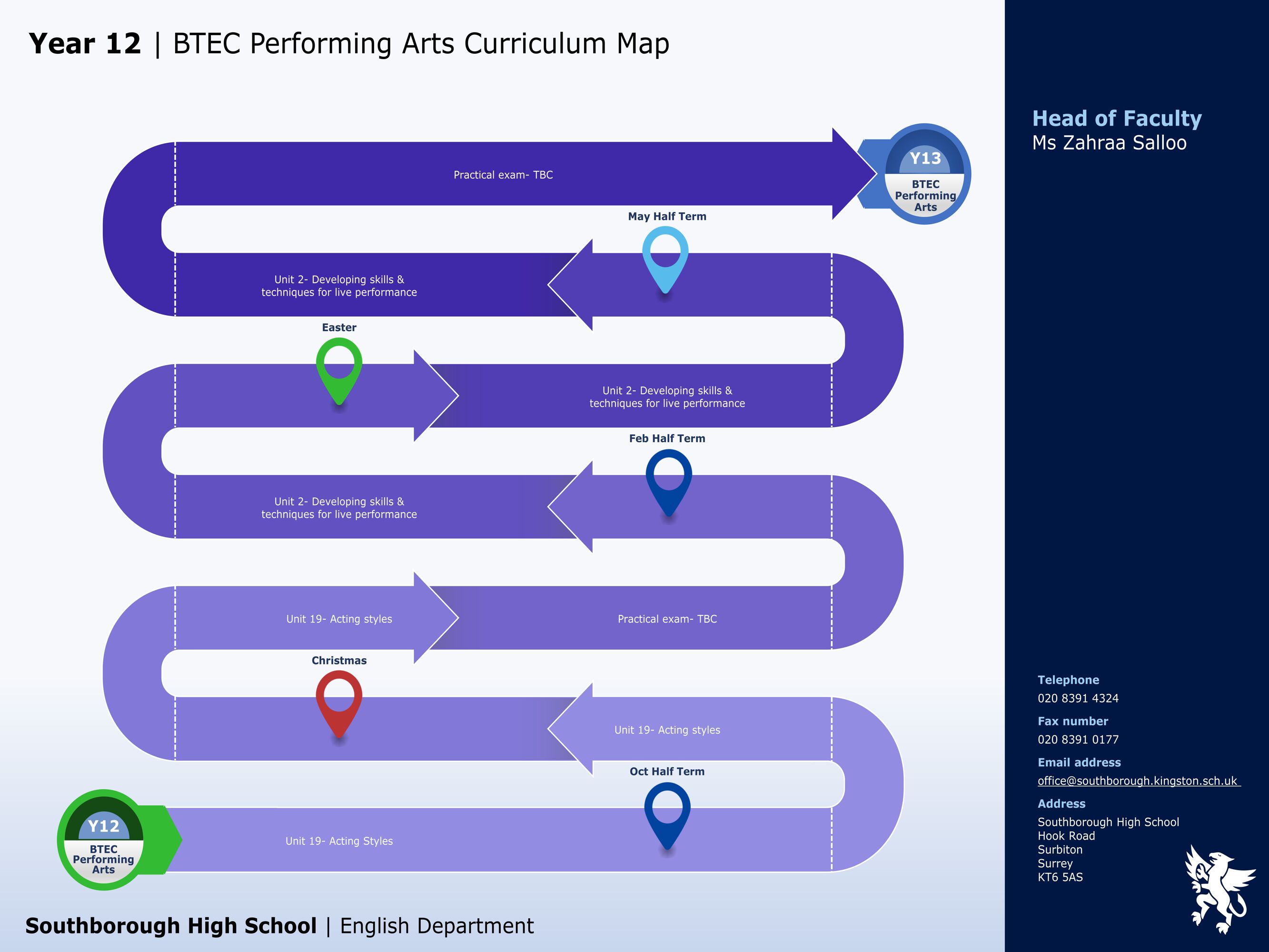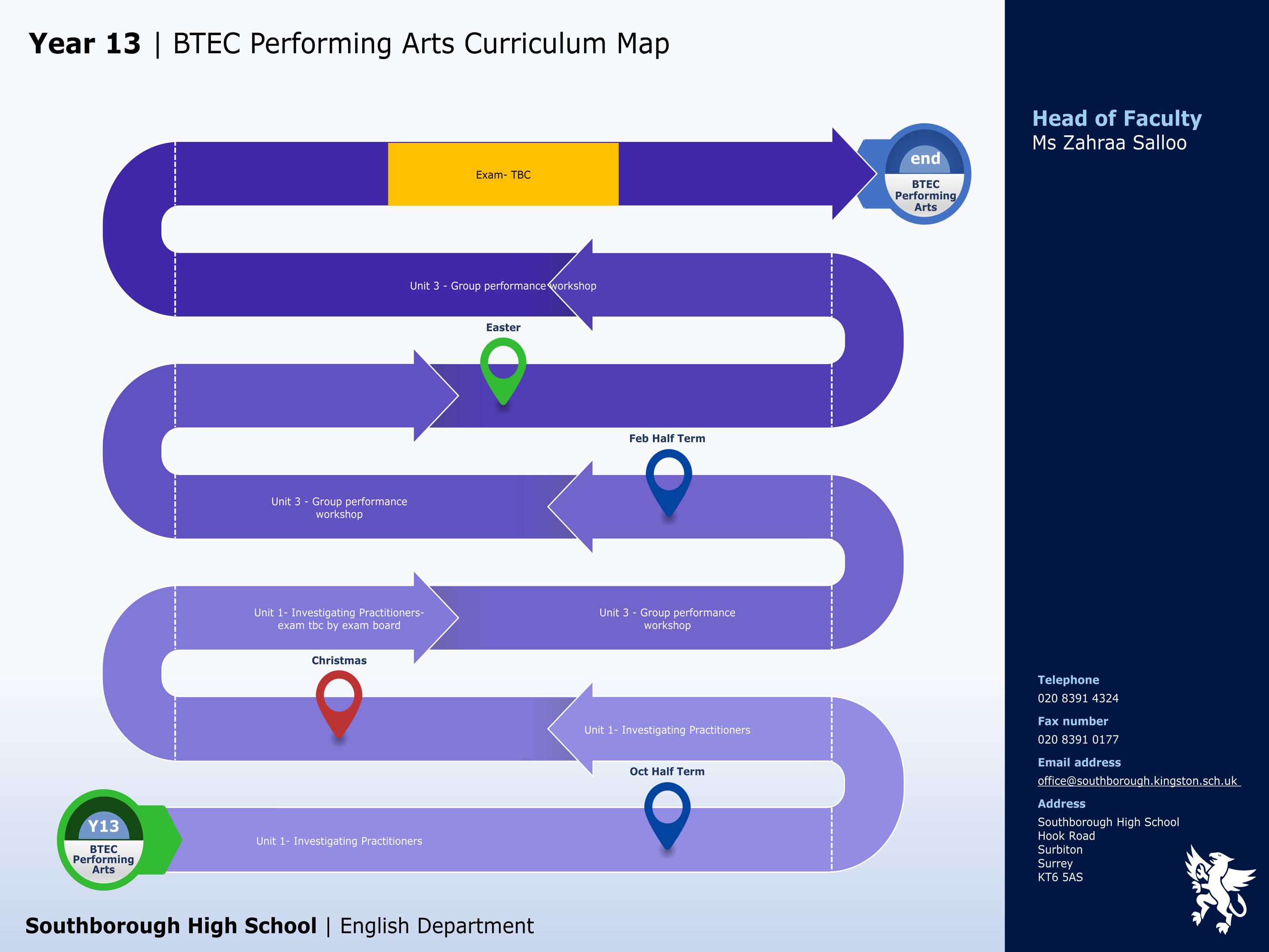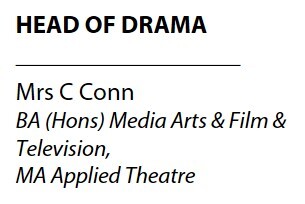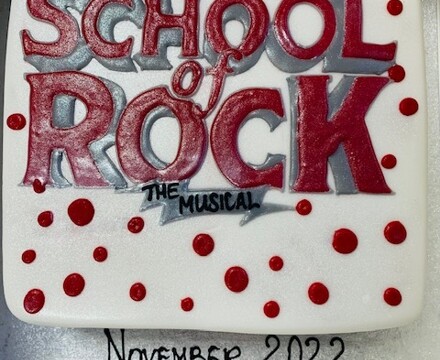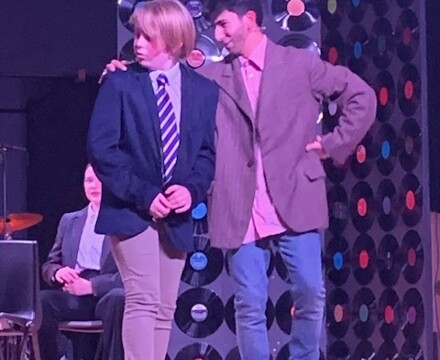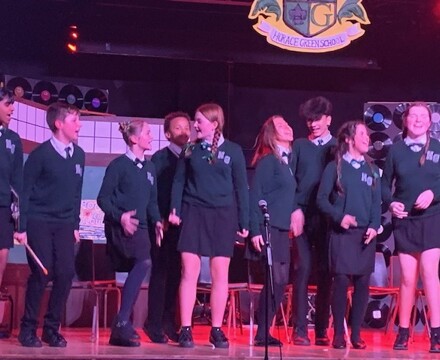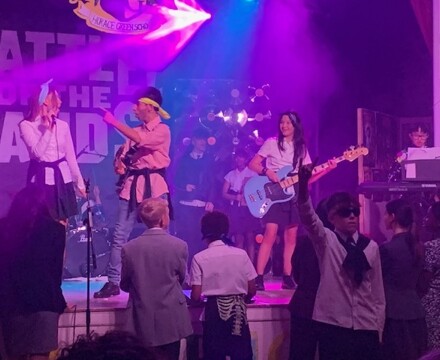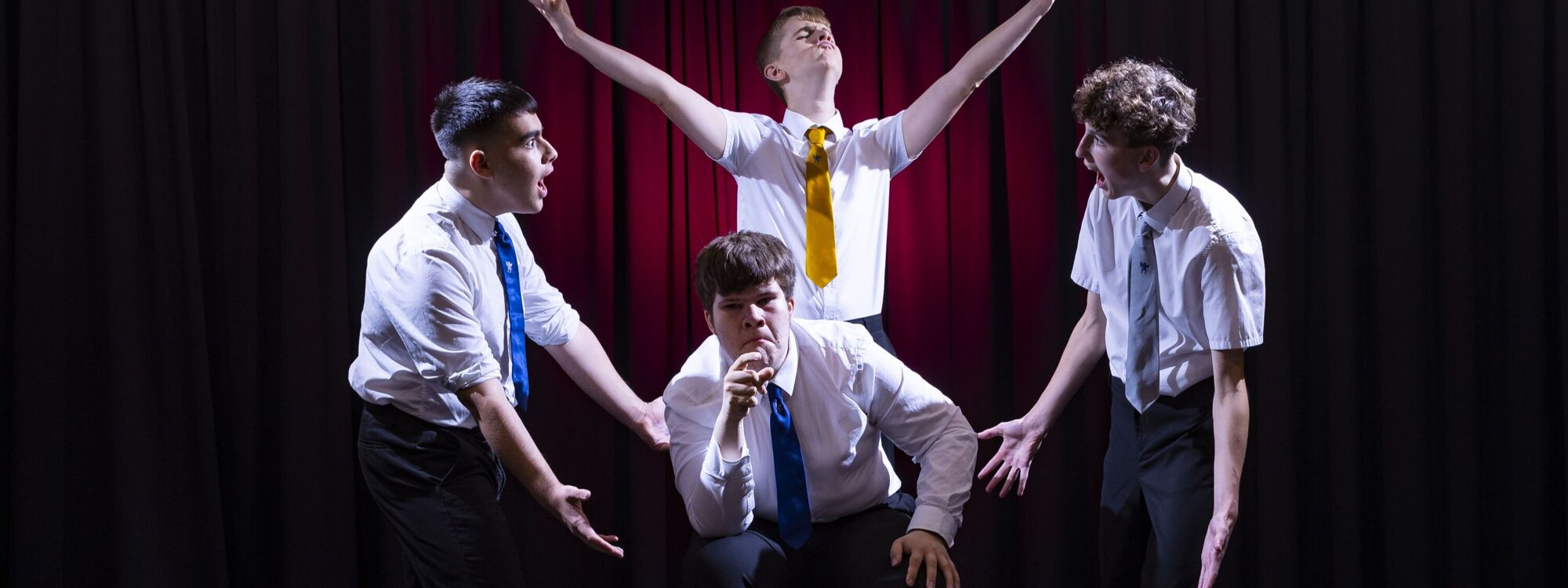
- Home
- Curriculum
- Subject Information
- Drama
Drama
Back
“All the world's a stage and most of us are desperately unrehearsed.”
The Drama department is young and lively - just like our boys!
With our dedicated Drama studio students are fully supported in their learning environment to achieve their very best. The atmosphere of lessons, whether practical or theory-based, is focused and creative – with a strong emphasis on engagement.
Drama is an integral part of the life of an SHS student. Whether it’s starring in a production, learning public speaking skills, developing their teamwork, lighting designing, scriptwriting, we’ve got everything covered.
Outside of lessons each year group is invited to attend in-house productions and go on trips to the theatre. Previous trips have included ‘Wicked’, ‘The Woman in Black,’ ‘The Curious Incident of the Dog in the Night Time’ as well as the annual Christmas production at the Rose theatre.
As part of our commitment to students’ learning, we often invite leading practitioners to offer extra workshops. In recent years we have had representatives from The Globe, The Rose, The Old Vic, Splendid Productions, Kazzum, KIPA and Southside Theatre. Furthermore, we reach out to our wider community and have collaborated with Surbiton YMCA's theatre group Benchmark and with Tolworth Junior and Dysart Schools.
We also stage our own productions, giving students the chance to perform for peers, parents, teachers and the local community. This experience is vital to extending students’ performance and design skills, building confidence and enabling them to find out what life is like in front of and behind the stage curtain.
It is our intent that the Drama curriculum invests in our students the necessary knowledge, skills and understanding to become lifelong learners, thinkers, speakers, creators and critics. We offer provision inside and outside the classroom that engages our students – provision that is relevant to them and appropriate to their needs. We intend to “make the difference” to all students by:
- building emotional intelligence
- empowering employability not only in the creative industry but in all industries
- enabling them to garner confidence in writing, creating, developing and performing drama and theatre.
Our intent is to broaden our students’ experiences, knowledge and skills by placing challenge at the heart of a broad and balanced curriculum so that we stretch our students and push them beyond their aspirations. We want to immerse them in a range of culturally diverse styles of theatre and practitioners and to instil a love for exploring texts, interpreting character, experimenting with theatrical skill in devising and performing theatre. We want learning to be engaging but challenging to students so that they develop resilience and independence in the classroom and in the wider world.
Intent, Implementation and Impact: The 3 l's
Intent
It is our intent that the Drama curriculum invests in our students the necessary knowledge, skills and understanding to become lifelong learners, thinkers, speakers, creators and critics. We offer provision, inside and outside the classroom, that engages our students, is relevant to them and appropriate to their needs. We intend to "make the difference" to all students by:
- building emotional intelligence
- empowering employability not only in the creative industry but in all industries
- garnering confidence in writing, creating, developing and performing drama and theatre.
Our intent is to broaden our students' experiences, knowledge and skills by placing challenge at the heart of a broad and balanced curriculum so that we stretch our students and push them beyond their aspirations. We want to immerse them in a range of culturally diverse styles of theatre and practitioners and to instil a love for exploring texts, interpreting character, experimenting with theatrical skill in devising and performing theatre. We want learning to be engaging but challenging to students so that they develop resilience and independence in the classroom and in the wider world.
Implementation
In line with the national curriculum for English, in Drama pupils are able to adopt, create and sustain a range of roles, responding appropriately to others in role. Students have opportunities, both inside and outside of the drama classroom, to improvise, devise and interpret scripted drama for one another and are able to rehearse, refine, share and respond thoughtfully to drama and theatre performances. We are clear that effective learners are not factory produced and therefore believe very much in the value of experiential learning; the Drama department offers students the opportunity to to take exams in LAMDA Public Speaking. Students at KS3 take part in The Shakespeare Schools Festival and there are further opportunities for the whole school (and our local girls' school) to collaborate on a musical production.
Moreover, our curriculum is centred around enriching, culturally diverse styles of theatre such as Greek Theatre, Italian theatre and Japanese Bunraku theatre, and practitioners such as Brecht, Frantic Assembly and Stanislavski , as well as age-appropriate texts from Shakespeare, Aykbourn and Kelly. These schemes of learning are designed to create opportunities to incrementally develop public speaking, analysing, creating and performing drama and theatre across all key stages. Likewise, theatre design is as important to the drama curriculum and so students learn about lighting, set, sound and costume design. Creativity is enriched in the classroom, with extra-curricular but also with trips to the theatre and workshops with professionals. The drama department has something to offer for all students.
Impact
We strive to ensure that our students' attainment is in line with or exceeds their potential when we consider their different starting points. In tracking the progress of our learners, we consider the age related expectations for each year group and use a range of performance measures to evaluate curriculum impact: this includes learning walks and student voice, alongside summative outcomes. We are committed to ensuring that students will make at least good progress in the development of their theatrical skill, interpreting character, creating and performing effective drama from their last point of statutory assessment but also that they become more resilient, independent, confident and emotionally literate. In line with our school's values, resilience is measured by teacher assessment through taking on roles and responsibilities and through encouragement of speaking aloud as well as demonstrating practical work. Furthermore, students are also selected to take part in LAMDA workshops where they work towards a qualification in Public Speaking. We intend the impact of our Drama curriculum will ensure our students are academically, emotionally and socially prepared for life beyond our school.
Key Stage 3
Students in Years 7, 8 and 9 have one lesson of drama a week. For each year group, students study at least one style of theatre and a text which embed the skills needed to be confident and successful performers, designers, creatives and critics. Topics across the ks3 curriculum include:
- Physical Theatre
- Silent Movies
- Technical Theatre
- Blood Brothers
- Commedia Dell'Arte
- Bertolt Brecht
- Blackout
- Constantin Stanislavski
- Stage Combat.
Key Stage 4 Course
Drama GCSE
Exam Board: AQA
At KS4, students follow the AQA GCSE Drama syllabus whereby they take part in a series of workshops, exploring practitioners such as Frantic Assembly and Splendid Theatre, as well as delving further into the work of Brecht and Stanislavski. These workshops enable students to become fully prepared to start Component 2- Devised theatre. Other areas of the GCSE include:
- The study of the set text, Blood Brothers
- Live Theatre
- The roles & responsibilities within the theatre
- Acting
- Puppetry
- Costume Design
- Lighting design
- Sound design
- Set design
The work is assessed through three components:
- Component 1- a written exam (60%)
- Component 2- a devised performance and a log book (20%)
- Component 3- texts in practise (20%)
Outside of lessons, each year group is invited to attend performances at least once a year. Past trips have included The Lion King, The Caucasian Chalk Circle, The Woman in Black and The Play That Goes Wrong, along with the annual Christmas production at the Rose Theatre, Kingston.
As part of our commitment to students’ learning, we often invite leading practitioners to offer extra workshops. In recent years, we have had representatives from The Globe, The Rose, The Old Vic, Splendid Productions, Benchmark and Kazzum.
We also stage productions, giving students the chance to perform for peers, parents, teachers and our local community. This experience is vital to extending students’ performance skills and enabling them to find out what life is like in front of and behind the curtain. It also gives students opportunities to perform and support at local venues such as The Corner House in Surbiton and The Rose theatre in Kingston. We enjoy collaborating with our local girls’ school on whole school musicals which have been a huge success for both students and our school community. Previous productions have been Oliver, Grease and, most recently, The School of Rock! Photos of which are available on the drama department’s Twitter and Instagram pages.
AQA GCSE Drama Specification
Key Stage 5 Course
Level 3 BTEC Performing Arts
Exam Board: Edexcel
Edexcel Performing Arts information
A BTEC in Performing Arts is widely recognised in the workplace. People with qualifications in Performing Arts are considered to have acquired the ‘soft skills’ that businesses value such as confidence, empathy, the ability to communicate to the public and also to work under pressure.
So even if you do not see acting or the performing arts as a career the skills that you learn in BTEC Performing Arts are valuable and transferable.
Skills students will learn and develop:
- Critical analytical skills- both writing and verbalising, of performances and of yourself as an actor
- Enhancing current performance skills- practitioners and styles
- Harvard referencing
- Interpreting more complex texts
- Identify why playwrights write what they do-context
- Collaborating
- Leading/team building/confidence boosting/developing emotional intelligence/ self-discipline
Summary of the course
This is an Extended Certificate, the equivalent of one A-level and is valued as such by universities and employers. It is intended to be taken alongside other Sixth Form courses.
The structure is 4 units over two years with four lessons or workshops every week. The focus is on acting and is very practical.
The units cover three mandatory areas: Investigating Practitioners’ Work; Developing Skills and Techniques for Live Performance (exploring Complicitie and The Paper Birds), and Group Performance Workshop. The fourth unit focuses on Acting Styles where students partake in a series of workshops with a focus on the following practitioners: Antonin Artaud, Steven Berkoff and Brecht.
Drama Curriculum Maps
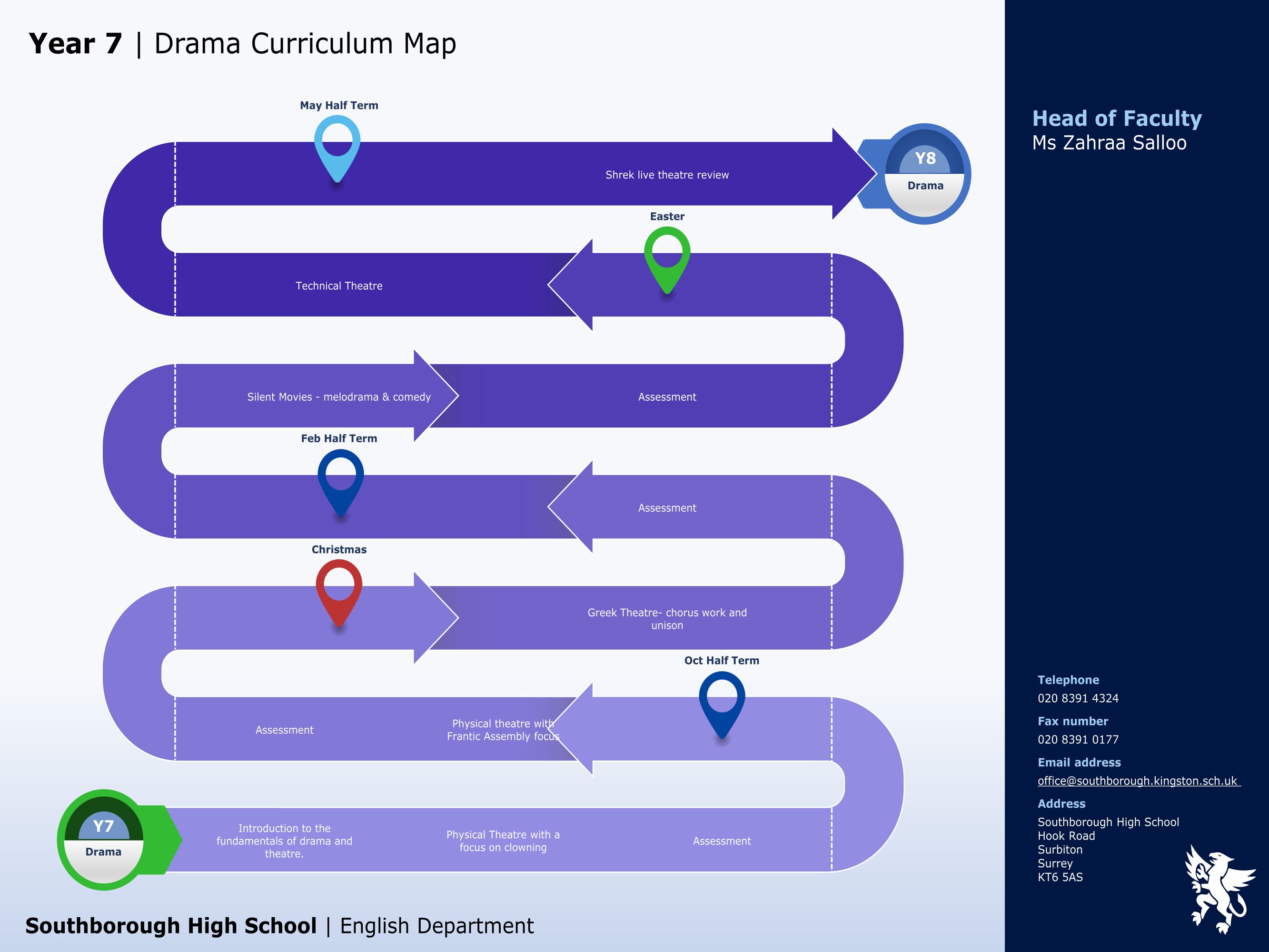
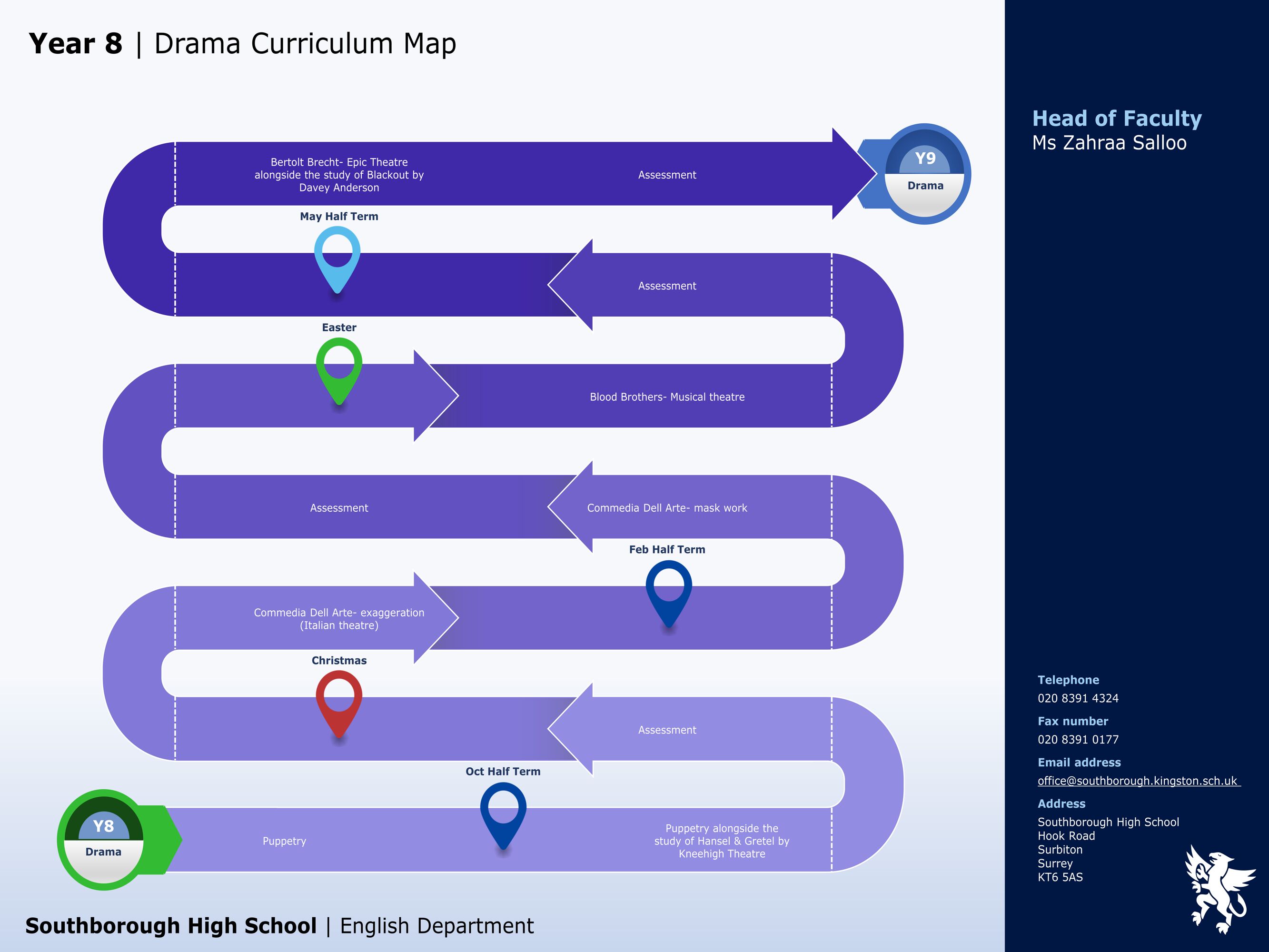
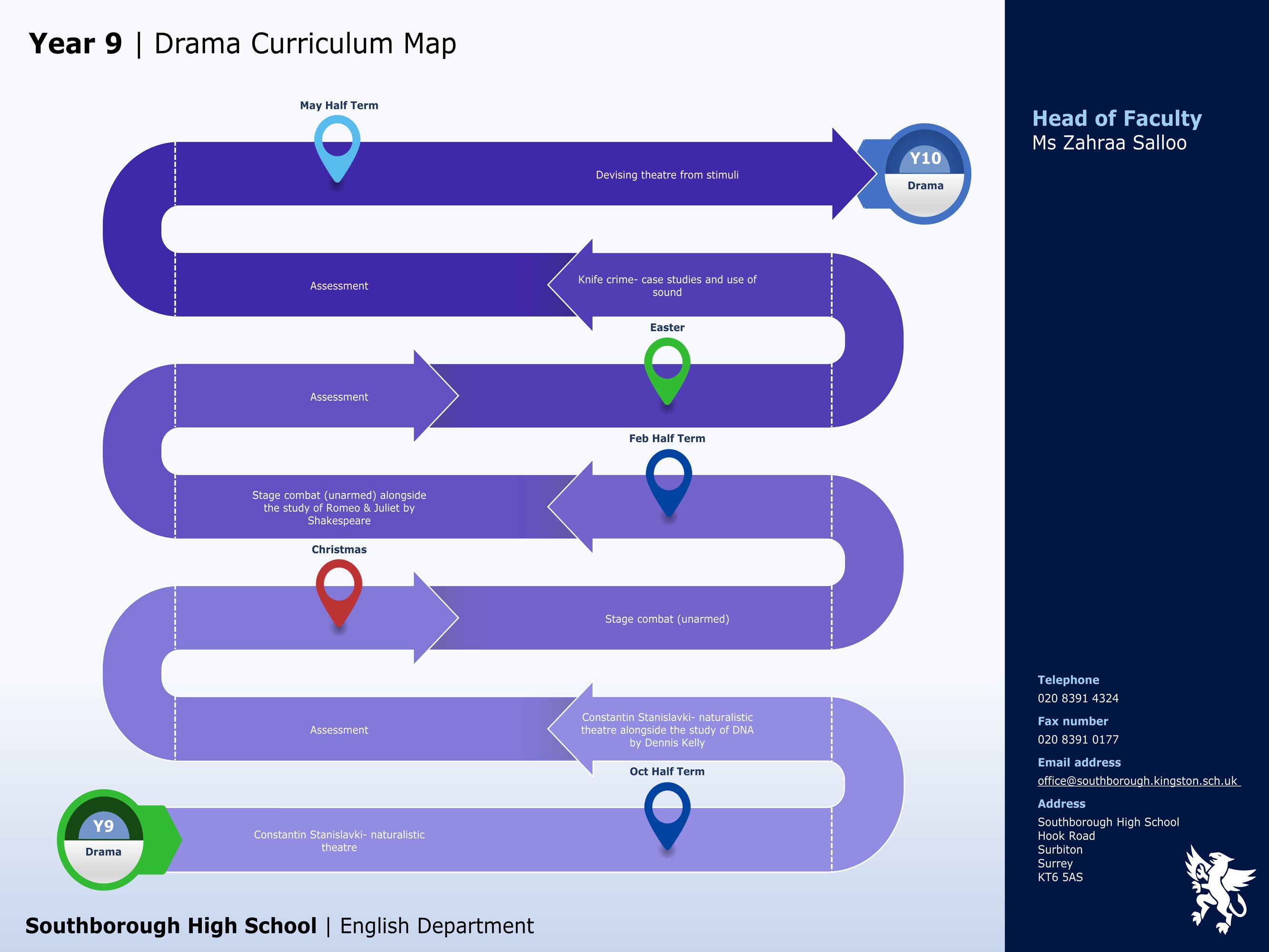
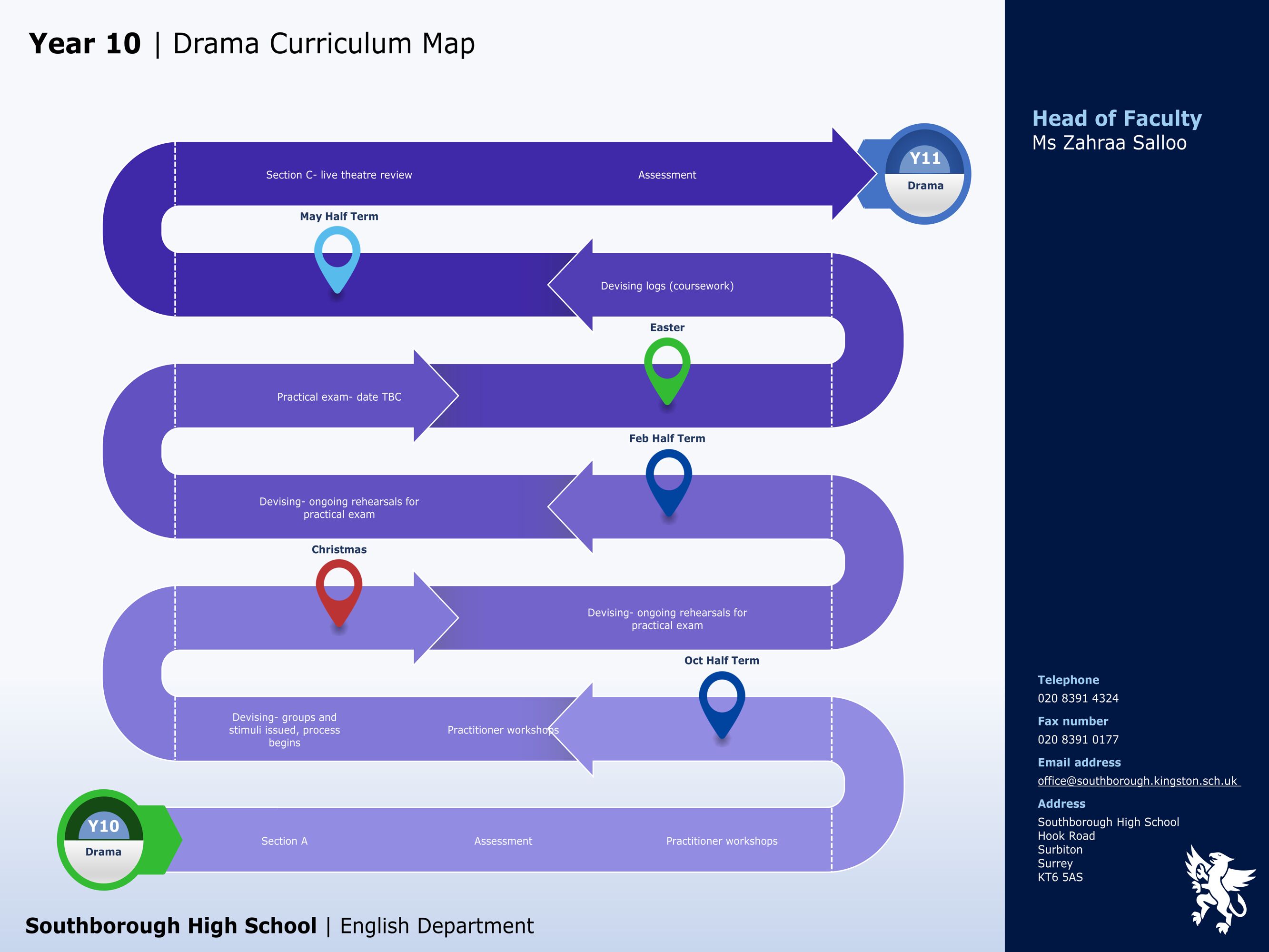
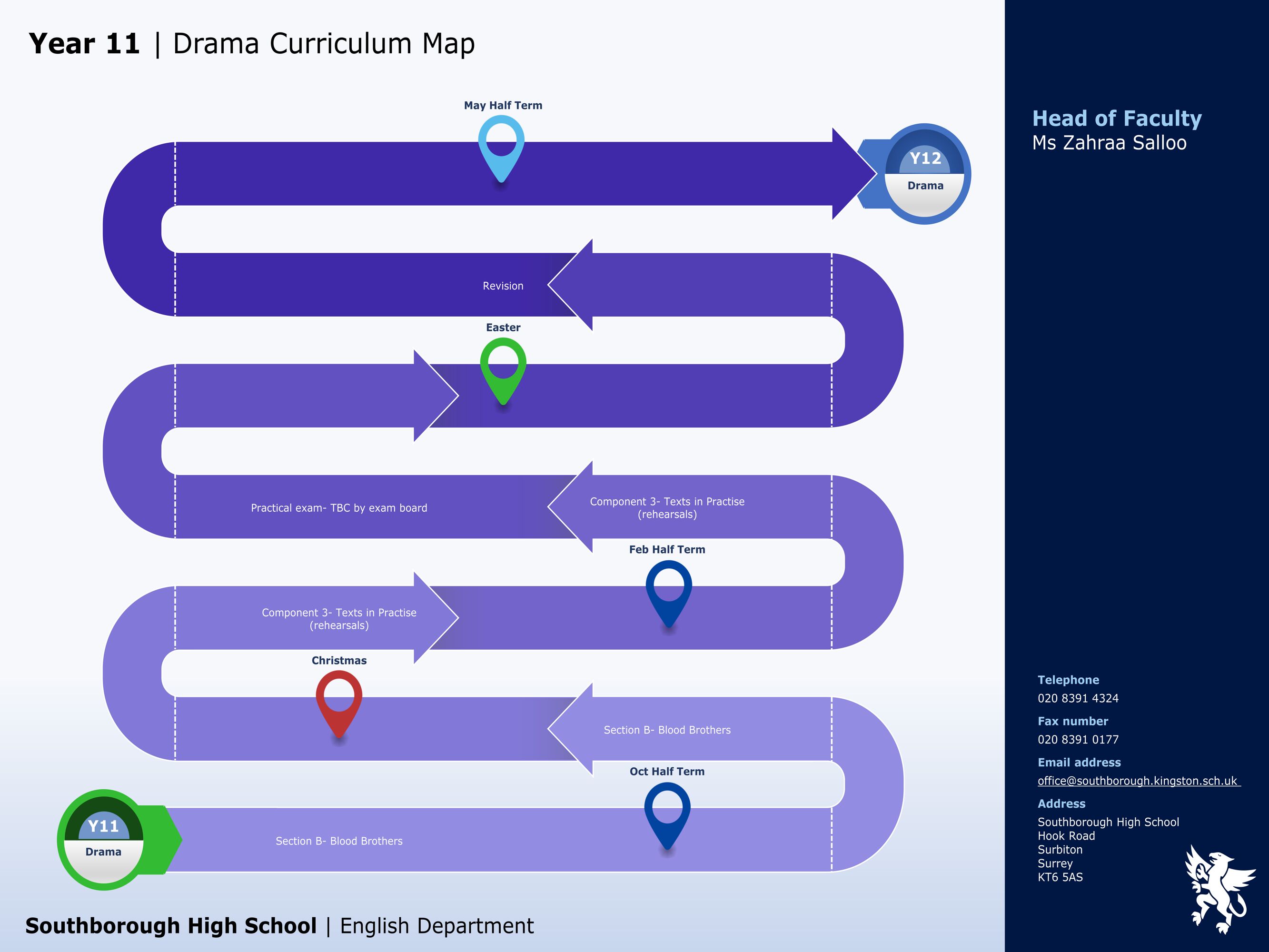
BTEC Performing Arts Curriculum Maps
